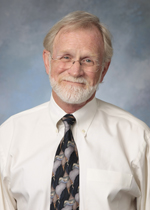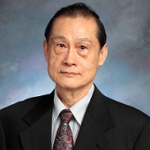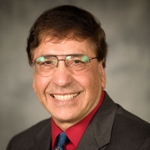
Engineering
May 22, 2017
The Shiley School of Engineering is proud to honor three retiring professors. Professors James Male, Wayne Lu, and Zia Yamayee retired at the end of the spring 2017 semester.
 James W. Male
James W. MaleA third-generation engineering professor, James Male grew up in a farmhouse new Schenectady, New York that later became home base for his grandfather’s civil engineering firm.
Jim earned a bachelor’s degree in civil engineering from nearby Union College in 1968, and a Ph.D. in environmental engineering from Johns Hopkins University. He began his career as an assistant professor at the Illinois Institute of Technology’s Pritzker Department of Environmental Engineering. In 1977, he was hired as an associate professor in the Department of Civil and Environmental Engineering at the University of Massachusetts-Amherst, where he stayed for 20 years and held various positions, including associate department head and graduate program director.
In 1997, Jim joined the University of Portland as the Edwin and Sharon Sweo Chair in Engineering and quickly became immersed in a myriad of projects, earning UP’s Deans Award for faculty leadership in 2010.
Jim has been an active researcher, writing books on water distribution systems and articles for the various environmental and water resources journals, as well as technical reports for organizations such as the Environmental Protection Agency and the U.S. Department of Transportation.
Jim has conducted funded research on resource management, water supply and more through grants from the National Science Foundation, The U.S. Department of Defense and the U.S. Department of the Interior, and has consulted for many organizations including the World Health Organization, Washington State Department of Ecology and the U.S. Army Corps of Engineers. He is also a member of several honorary and professional societies, including the American Society of Civil Engineers, the Association of Environmental Engineer and Science Professors, and the American Water Works Association.
“In my courses, I have always emphasized the principles of engineering and how they’re applied in the real world,” says Jim. “Students have to be ready to go into their future careers when they graduate. But I also want to make sure that they don’t get their education in a bubble – it’s crucial they are technically competent but also important to gain a broader perspective outside their major, including the arts and social sciences.”
Jim is probably well known for riding his bike to work most days. In his retirement, he looks forward to cycling more … but not to work.

Wayne Lu came by his interest in engineering as a child. From the radio and television to the lights inside the home and outside, he just wanted to know how things worked. Such objects fascinated him, and, in his native Taiwan, electrical engineering is considered a top profession. A natural fit was born.
Wayne began his college career by getting his Bachelor of Science in Electrical Engineering at Chung-Cheng Institute of Technology in Taiwan in 1973. He then came to the U.S., where he went on to earn both his master’s degree and doctorate in the same field at the University of Oklahoma in the 1980s. In 1988, he began teaching electrical engineering at the University of Portland.
During Wayne’s tenure at UP, he has taught nearly three different generations of students. He has seen the electrical engineering curriculum go from the tactile aspect of computer hardware and how things function to the more intangible elements such as digital design work. Nevertheless, Wayne has always focused on teaching his students the practical know-how and the hands-on experience they need to succeed in their careers.
“When I think about how I would like students to remember me, I would like them to say, ‘Dr. Lu taught me something useful,’” says Wayne. “Some of them still keep in touch and tell me that they regularly use the things they learned in my classroom, even 20 years later.”
Beyond the classroom, Wayne was involved in pioneering research, earning a grant from the National Science Foundation (NSF) for his work in programming computers to recognize sign language, as well as earning several Arthur Butine Grants from UP for projects like an automated reverse engineering manufacturing system and intensity-invariant color image segmentation. He also was both a member and chair of the Health and Security Committee, and the faculty advisor for the Vietnamese Student Association and the Chinese Student Association.
Wayne has contributed to several publications and has presented at many professional conferences such as the International Conference of Cognitive and Neural Systems and the IASTED International Conference on Signal and Image Processing. He is also a member of the Institute of Electrical and Electronics Engineers (SEEE) and the IEE Systems, Man and Cybernetics Society (SMC).
“In our work, I think it is important to be able to do research as well as teaching,” says Wayne. In order to accurately help someone else learn, you have to understand it yourself.”
In his post-teaching years, Wayne and his wife intend to spend their summers in New Jersey with their daughter and two grandchildren, as well as spend their winters in both Taiwan and Portland.
 Zia A. Yamayee
Zia A. YamayeeA native of Afghanistan, Zia earned his bachelor’s degree from Kabul University in 1972, becoming the first college graduate in his family. He went on to earn his master’s degree and doctorate from Purdue University, after which he held teaching positions in the engineering departments at Clarkson University, University of New Orleans, and Gonzaga University. Zia became dean of the School of Engineering at Gonzaga University in 1988, a position he held until he joined the University of Portland in 1996 as dean of engineering and professor of electrical engineering,
During his tenure, he oversaw several accomplishments, including increasing undergraduate engineering enrollment by 81 percent from 1998 to 2010, improving student academic quality and developing the Engineering Project Development Fund to facilitate collaboration between faculty and students on engineering projects that would result in innovative and publishable work.
In 1997, the expansion and renovation of the engineering building was identified as one of the school’s top priorities, and under Zia’s guidance the project became a reality. Thanks to Zia’s leadership as dean and through ongoing University fundraising efforts, the endeavor began. In 2010, the transformation was complete and the building was renamed Donald P Shiley Hall, and the school was renamed the Donald P. Shiley School of Engineering.
Zia also contributed to the field of engineering through numerous consulting projects, including work for the Department of Energy, the Bonneville Power Administration and Systems Europe, S.A. His projects have included power system planning, maintenance scheduling, and hydro-thermal simulations. He has also authored and co-authored numerous articles, technical reports, and a textbook entitled, Electromechanical Energy Devices and Power Systems, which has been translated into Chinese.
In 2011, Zia was appointed the Brother Godfrey Vassallo Distinguished Professor of Engineering, named after the school’s founder. Upon returning to the classroom full-time after 24 years of serving in administrative positions, Zia was gratified to learn that he still truly enjoyed teaching and interacting with students.
In recent years, Zia has given numerous presentations on outcomes-based engineering curriculum development and the implementation of the ABET Criteria for Accrediting Engineering Programs.
“Early on in my life, I learned that excellence does not have a finish line; you don’t get there and sit on your laurels,” said Zia. “Excellence is a journey, and during my time at UP, I have tried to improve on everything that I do. I have enjoyed being a member of this superb community, and I am grateful for the opportunity to have served our students, faculty, staff and alumni as best as I could. It has been an amazing journey.”
University of Portland
5000 N. Willamette Blvd.,
Portland, Oregon 97203-5798
503.943.8000
This website uses cookies to track information for analytics purposes. You can view the full University of Portland privacy policy for more information.
